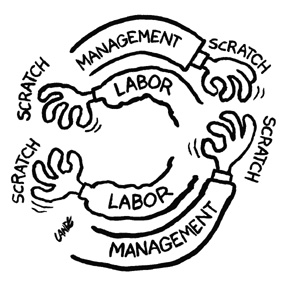Wal-Mart is coming to town.
U.S. Companies Fire Mexican Union Activists - More than 20 workers were fired from a Honeywell plant in Chihuahua in December, where an organizing drive by an independent Mexican union was taking place. According to the workers - all women - they were individually interrogated for four hours before the firings, reports Labornotes. At a General Electric plant in Ciudad Juarez, the site of a similar organizing drive, 11 workers were fired. Some of the 11 had assisted or spoken with a delegation of U.S. unionists that had visited Juarez in November. Six were reinstated in late December after protest letters were sent to the U.S. Congress.
Revenge Planned for Pro-NAFTA Politicians? - It's possible that organized labor may repay Democrats who voted yes on NAFTA, by recruiting and financing pro-labor candidates to run against them in upcoming elections. Statewide, only Rep. Jolene Unsoeld of District 3 voted against NAFTA. According to a Seattle P-I report by Rebecca Boren, area labor leaders are considering challengers for Mike Kreidler, a Democrat from District 9. A big disappointment for Seattle-area labor was Jim McDermott's yes vote.
If your boss is a jerk or you hate where you work, give us a shout and we'll check the facts out! Address your facts to Doug Collins c/o The Free Press, 1463 E. Republican, #178, Seattle 98112. Or...
U.S. Newspapers Put Their Own Spin on the Mexican Government - From reading news service reports in the mainstream media, one would think Mexican President Salinas was a peace-loving saint, eager to please the rebelling Chiapans. Death reports in our newspapers generally echoed the official Mexican figure of about 100. Even after the government declared a cease-fire, human rights groups have reported continued fighting, torture, mass executions and the discovery of mass graves. The rebellion was timed to coincide with the implementation of NAFTA on Jan. 1, which stands to severely disrupt the agrarian economies of Mexican Indians. For example, cheap corn imports from the U.S. and the likely conversion of corn farmland to export crops such as coffee will probably displace many Mexican farmers and upset local barter.
NEXT ISSUE: You're Fired!
Have a Labor-related story to tell? Good news or bad.. send it to Doug Collins WAfreepress@gmail.com and he'll tell the world.
[Home]
[This Issue's Directory]
[WFP Index]
[WFP Back Issues]
[E-Mail WFP]





Contents on this page were published in the February/March, 1994 edition of the Washington Free
Press.
WFP, 1463 E. Republican #178, Seattle, WA -USA, 98112. -- WAfreepress@gmail.com
Copyright © 1994 WFP Collective, Inc.

 One of the most hopeful means of creating democracy in the workplace is the producer cooperative. Unlike consumer co-ops (such as Group Health and the PCC grocery stores) producer co-ops are owned by the workers, who can vote on company policies and elect company managers. Far from a hippie invention, producer co-ops in the Pacific Northwest have a long blue-collar tradition predating the love-in by two generations.
One of the most hopeful means of creating democracy in the workplace is the producer cooperative. Unlike consumer co-ops (such as Group Health and the PCC grocery stores) producer co-ops are owned by the workers, who can vote on company policies and elect company managers. Far from a hippie invention, producer co-ops in the Pacific Northwest have a long blue-collar tradition predating the love-in by two generations.